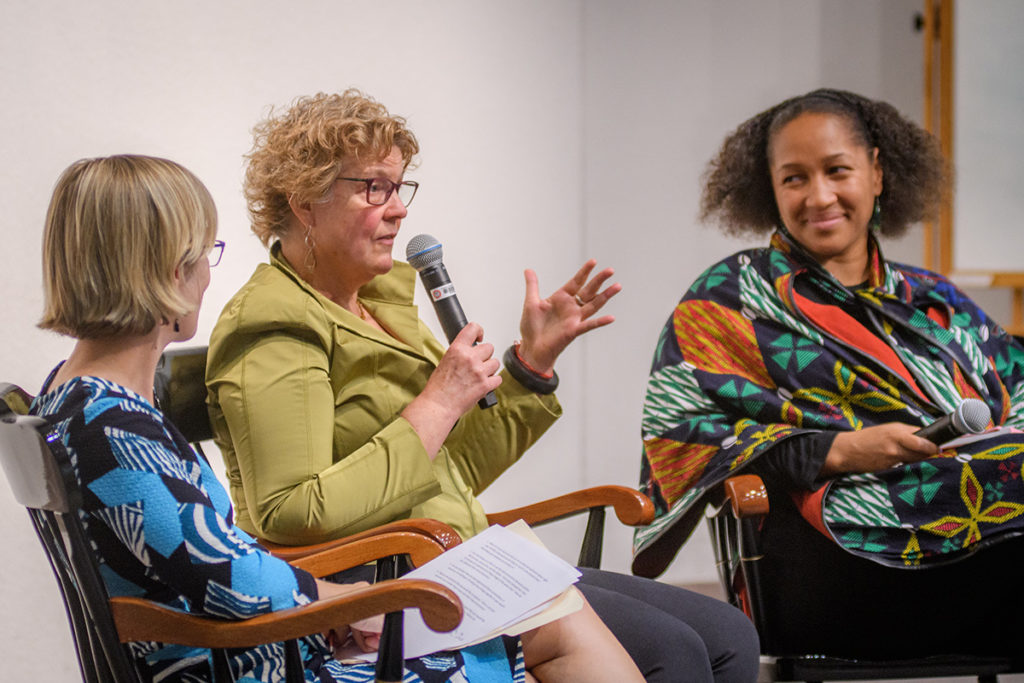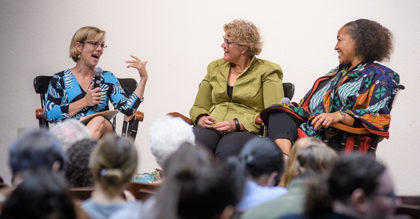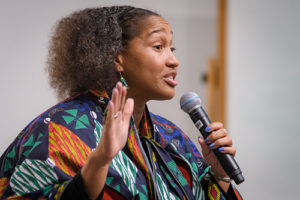Climate change conversation heats up on campus

Battle cries are intended to inspire soldiers, reminding them that their fight is worth fighting.
The Sept. 29 symposium convened at Clark University by A New Earth Conversation was nothing less than a battle cry, whose message rang loud and clear: We must respond to the injustices being committed on each other and our planet — and quickly.
A New Earth Conversation is a campuswide initiative to encourage constructive discourse about climate change and its far-reaching impacts. The daylong event focused on the central theme, “All Together Now / politics, economy, social justice, and the climate.”

Clark faculty, students, and the public explored the intersection of the world’s most pressing environmental, climate, and social issues. The discussion sessions moved through three phases of critical thought: “Waking Up,” “Seeing the Whole,” and “Moving from Here.” The event was co-convened by Ellen Foley, associate professor of international development and social change, and Sarah Buie, professor emerita and research scholar in the Visual and Performing Arts Department and past director of the Higgins School of Humanities.
Foley led a keynote conversation that included Melissa Hoffer, chief of the Energy and Environment Bureau in the Massachusetts Attorney General’s office, and Reverend Mariama White-Hammond, pastor at New Roots AME Church in Dorchester, Mass. In a convergence of the legal and spiritual spheres, the two shared their expertise on climate-change efforts and compared perspectives about the entangled social issues at play.
To open the panel, Foley explained the mission behind the symposium: “It’s an innovative, quirky, introspective, very Clark attempt to think through challenges that are being raised by the present moment.”

As an ecological and social justice advocate, White-Hammond works with the faith community, imploring religious groups to take a stand on climate change, which she describes as a crisis of spirituality. She posed the question, “Who do we choose to be?” explaining that progress is only possible if we fix the “underlying ethos” that fosters injustice.
White-Hammond recommended building a coalition against climate change, arguing that pursuing this goal also offers the opportunity to advance other social issues, like racial justice. She dared the audience to challenge their assumptions of what is true and not true: “My big charge to you all is to go wild and try some new ways of being.”
Hoffer pleaded with the audience to change old and outdated ways of thought. “This awakening, this mindfulness, is so urgent,” she said.
Since 2017, Hoffer’s office has filed or participated in over 30 actions challenging Trump administration rollbacks of environmental regulations. Optimistic about the future, Hoffer cites a powerhouse of activism that is galvanizing opposition efforts to climate disruption. “People are really starting to wake up to the [high] stakes, and that is extremely motivating,” she said.
Both speakers stressed the necessity of envisioning a better world, then working to achieve it.
White-Hammond encouraged universities to usher in new wave of climate innovation by creating “spaces for people to begin to imagine new systems and alternatives.” She recommended adopting more experimental, project-based learning.
Hoffer implored students and faculty to take an interdisciplinary approach to climate change as a way to deepen overall understanding of the issues. “If your artists are understanding what your scientists know, and vice versa, that’s radical,” she said.
The keynote conversation concluded with one last rousing request from White-Hammond, who urged audience members to “throw everything we have” at the challenge of climate change. “Let’s figure this out together.”
A New Earth Conversation is funded through the Christopher Reynolds Foundation. The day’s events were co-sponsored by Clark’s Center for Race, Gender and Area Studies.


